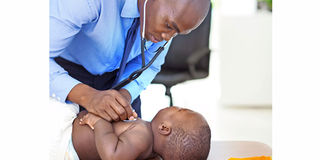BOSIRE: It shouldn’t be this hard to find specialists

Existing specialists should also mentor and train young doctors. PHOTO| FILE| NATION MEDIA GROUP
A friend asked me to recommend a paediatric neurologist in Nairobi. The one who was attending to them was so busy that it took at least three months to get an appointment. Clinic visits with the specialist were frustrating; there were so many patients, that one had to wait till as late as 11 in the night to be seen.
I could not imagine a waiting room full of babies with cerebral palsy, epilepsy, attention deficit and hyperactivity disorder, stroke and autism, having to sit patiently for hours.
However, the neurologist I knew off the top of my head was the very same one they were opting out of.
I called a paediatrician for recommendations, and she gave me just two more options. A search on the Kenya Medical Practioners and Dentists Board website yielded only six paediatric neurology experts to serve more than 20 million children who may need their services.
They are mostly based in Nairobi and its environs, so children in need of their services must travel to them. So much for access to healthcare!
When I asked a paediatrician friend if she would be interested in pursuing paediatric neurology in view of the glaring specialist gap, she said she would not venture into such a depressing field, waking up every morning to deal with difficult diagnoses, frustrated parents who don’t know what to do and babies teetering on the edge in the intensive care unit.
That’s not how she envisioned spending her days. It would drive her over the edge.
In my short stint as a medical officer intern at the paediatric unit of a national referral hospital, I saw what she meant.
There were babies who spent half their lives in the wards. There were little ones who convulsed non-stop while we pleaded and bargained with the intensive care unit to miraculously find them a bed so they could be put on the cardiorespiratory support they needed.
WE CAN TRAIN OUR OWN
There were the delicate newborns with meningitis who would leave us biting our fingers wondering whether they would survive the infection and what mayhem the complications would inflict on their future.
I have met parents with babies with autism who will do anything to relieve their little ones of the burden of the diagnosis. They fly to all parts of the world seeking care. They enroll for all clinical trials, hoping for some improvement. They spend millions to pay for experimental treatments that may not have demonstrated much by way of results.
Caring for babies with neurological conditions is heavily taxing for the family -- physically, emotionally and financially. The stress has broken families and caused untold pain.
To add insult to injury, most medical insurance covers will not cater for these conditions and when they do, the cap on expenditure is not adequate.
These babies face the double tragedy of not having access to care due to inadequate specialists. A doctor cannot be forced to take up a speciality just because there is a gap.
However, the government can mitigate this by making it attractive for young doctors to consider studying in fields with shortages. The Ministry of Health has successfully done so in the past by providing conditional scholarships in areas such as anaesthesia and ophthalmology and this has seen the numbers of specialists increase markedly.
It was thought that bringing foreign doctors would help, while buying time to train our own. However, there is need to review the real gaps and plan accordingly.
We can train our own super-specialists. We have enough patients, adequate technology and medical schools. The challenge is to help these schools grow their capacity to train the very highly specialised skills that we are still seeking abroad.
Existing specialists should also mentor and train young doctors and help them get scholarships, from wherever in the world they are, and come back home to help our own.
It is not right that we have only one emergency medicine specialist in a country overrun by boda boda accidents, or one dental radiologist after all these years of training dentistry in Kenya. It is a sign of poor planning for human resources for health.



